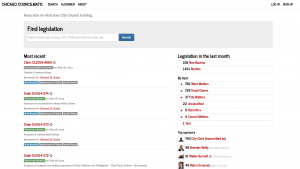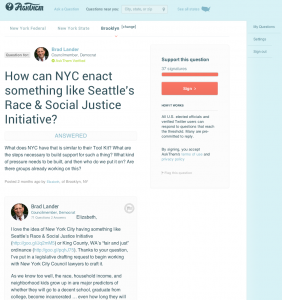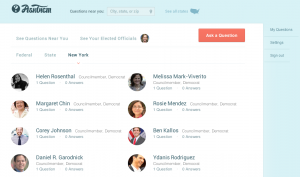
“Councilmatic 2.0” – we seek additional charitable funding to bring this open-source app to NYC and nationwide.
Towards closing the feedback loop with local governments, and writing & introducing your own city’s laws.
Faced with gigantic problems (catastrophic climate degradation, local election disenfranchisement, police militarization, lobbyist influence on policymakers, more) – why aren’t more popular policies (carbon tax, community policing, immigration reform, right-to-vote laws) being enacted in cities? (The answers in Congress & state houses are a longer story, of course.)
Towards this goal, finally, open-government developers are making progress on tools for local self-determination in our representative democracy. Technology for #opengov is approaching an exciting milestone – it’s becoming possible to collaboratively draft legislation for your city government, entirely on free & open-source websites. In other words, it’s nearly possible to close the feedback loop of civic engagement with your city government – to channel your ideas into real legislation at the local level, with open data for cities to share and tools that are fairly user-friendly.
What issues to you want to see advanced in your city – a participatory budgeting program, municipal broadband access, community policing reforms? The free & libre & open-source tech tools are coming together, all from non-profit organizations with a public-benefit mission.
1. Raise your community issue and ask powerful questions – with AskThem.
Our free questions-and-answers website with public figures – a version of the White House’s “We The People” petition platform, but for every elected official and any verified Twitter account.
- AskThem has access to data for over 142,000 elected officials nationwide – enter your street address to see everyone who represents you, and ask your question.
- AskThem enables open public dialogue, especially with city council members – begin the conversation in your community and show support for your ideas. Elected officials can sign up to become verified responders, free of charge (over 80 nationwide have done so).
See also the much-missed open-source mapping software Shareabouts from our friends at the legendary NYC non-profit OpenPlans. Â See their client on GitHub, and contact Mjumbe Poe with questions or to get set up, he’s still maintaining it as Poe Public.
2. Â Deliberate and make a transparent decision with Loomio or DemocracyOS
- Gather support for your issue by holding an online conversation with your community on either of these open-source discussion platforms, and advance your issue towards a decision or vote among stakeholders.
- DemocracyOS offers rich media support for a contemporary look-and-feel in discussing topics in the news (more like Facebook for a vote within your affinity group).
3. Draft legislation collaboratively using myMadison (or GitHub)
- myMadison, from Open Gov Foundation, fills the important niche of enabling group annotation on legislative text – plus, comment and support or oppose. Example, US Public Participation Playbook.
- From this drafting tool, boilerplate public policies can spread between city networks to introduce, amend, hear in committee, and advance popular or expert-infused legislative initiatives to a vote.
- Introduce it. Find a sympathetic council member or legislative assistant and get the text you helped write into the process! Turn your community’s ideas and priorities and reforms into actual policy that organizers can rally around.
4. Track the status of legislation and local issues you care about in Councilmatic.
- Understanding and watchdogging the workings of local government requires open data and free tracking tools – see original Philadelphia and Chicago versions, for city council transparency and even local engagement.
- Our non-profit is excited to work to bring this app to NYC this year, with our allies in the forward-thinking City Council Speakers’ office and Mayor’s office. More to come, contact me if you’d like to help in NYC or to bring Councilmatic to your city…
5. Which brings it full-circle to AskThem, as a public whip count and public-knowledge builder with elected officials.
- Enter your address to geolocate your council members and ask them what the status is of your legislative initiative, or what the hurdles are in its committee.
- Build public support for policies by campaigning in an open public forum, one with ties to elected offiicals’ offices and the actual legislative process, around public meetings and district office visits and more creative organizing tactics.
To reiterate, I see significant potential return on investment for charitable funding of more free & open-source tools for local policymaking & city-resident participation. I’ve wondered openly if commercial public-feedback or petition platforms are having the impact we’d expect, given their level of investment and capitalization. Over eight years into the digital #opengov movement, we have dozens of technology tools for interacting with governments – so why aren’t more popular public policies becoming realities? My hypothesis is that they don’t (and aren’t designed primarily to) work to connect broad public initiatives with actual legislative outcomes, even if just a (still-meaningful!) city resolution.
Towards this goal, in the face of massive capitalization of commercial public-feedback platforms, non-profit orgs. still offer complementary value because their work & reputations as community projects incentivize them to prioritize features for end users and more-aggressive watchdogs, rather than their city clients and risk-averse officials in government – which is an important bulwark for public trust. Without naming any names of companies here, see in my April 14th blog post on unpacking commercial “govtech” from non-profit #opengov / #opendata projects.
I’ve written recently on this as growing digital & civic engagement, and as a proposal for an open “X11” data standard for constituent communications – as well as our primary sustainability plan to fundraise to build Councilmatic in 2015, which will create versions of OpenCongress for hundreds of U.S. cities. I’m eager to connect more over what’s needed and how PPF can help cities stay connected with their residents. I’m email: david at ppolitics.org, @ppolitics on the micropub. service, hit me up, I’m easy to reach and have non-profit funding prospectus ready-to-share, we’re eager to keep building in 2015 – but we need additional funding support to pay for open-source tech development time and our community outreach program.
Previously, June 3rd intro to this post, moved down for clarity:Â
Ahhh PdF15 conference time in NYC. This Friday, June 5th, at 3:30 pm, I’m pleased to be participating on a panel on “Designing the Digital Legislature” (excellent) with following folks: leading #opengov NYC Council Member Ben Kallos, Emma Mulqueeny of Rewired State (UK), Seamus Kraft of Open Gov Foundation, and moderated by Melissa Sandgren of Yahoo! & Harvard Kennedy School.
I’ll try to be scathingly entertaining in presenting our plan for Councilmatic, a unique open-data city council tracking & engagement website, in NYC and nationwide. I’ll be discussing its unique value in making local government info more widely-accessible and searchable, with free alert features & innovative engagement tools. Your city or town can join the Councilmatic project by getting your legislative data into roughly the Open Civic Data open standard! Much more to come on our NYC Councilmatic plans, including robust community outreach and SMS surveys for neighborhood input and city-council partnerships and more. Hey, YourNextMP was huge in the UK, and this model can work and scale to U.S. municipalities nationwide as an independent open-data project.

